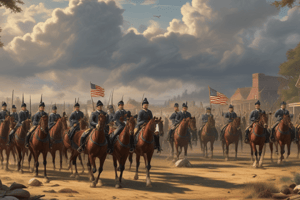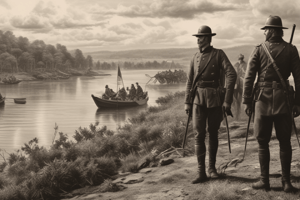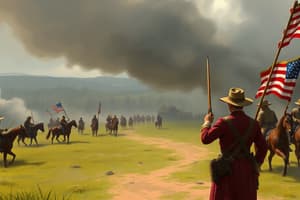Podcast
Questions and Answers
Following the Civil War, how did the Black Codes impact the lives of formerly enslaved people in the South?
Following the Civil War, how did the Black Codes impact the lives of formerly enslaved people in the South?
- They granted full citizenship rights, including voting and property ownership, ensuring equal participation in society.
- They restricted the rights and freedoms of formerly enslaved people, limiting their ability to own property, work freely, or move without restrictions. (correct)
- They established integrated school systems and promoted racial equality in education and employment opportunities.
- They provided economic assistance and land redistribution to help formerly enslaved people become self-sufficient farmers.
Which of the following scenarios best illustrates the application of the Roosevelt Corollary to the Monroe Doctrine?
Which of the following scenarios best illustrates the application of the Roosevelt Corollary to the Monroe Doctrine?
- The United States supporting Panamanian independence from Colombia to secure the rights to build the Panama Canal.
- The United States mediating a border dispute between Venezuela and British Guiana to prevent European intervention.
- The United States intervening in the Dominican Republic's financial affairs to stabilize the country and prevent European creditors from intervening. (correct)
- The United States annexing the Philippines after the Spanish-American War to expand its Pacific empire.
How did muckrakers contribute to the Progressive Era reforms?
How did muckrakers contribute to the Progressive Era reforms?
- By providing financial support to corrupt politicians and businesses, thus maintaining the status quo.
- By writing fictional stories that entertained the public but had no impact on social reform.
- By exposing social problems, corruption, and injustices through investigative journalism, thus galvanizing public opinion and support for reform. (correct)
- By advocating for laissez-faire economic policies that promoted unregulated business practices.
What was the primary motivation behind the United States' Open Door policy in China?
What was the primary motivation behind the United States' Open Door policy in China?
How did the Zimmerman Telegram influence public opinion in the United States regarding World War I?
How did the Zimmerman Telegram influence public opinion in the United States regarding World War I?
Flashcards
Reconstruction
Reconstruction
Period after the Civil War focused on rebuilding the United States and reintegrating Confederate states.
Freedmen's Bureau
Freedmen's Bureau
A US federal agency created to aid freed slaves and relieve the suffering of war victims during the Reconstruction.
Black Codes
Black Codes
Laws passed in the Southern states after the Civil War to restrict African Americans' freedom and compel them to work in a labor economy based on low wages or debt.
Imperialism
Imperialism
Signup and view all the flashcards
Open Door Policy
Open Door Policy
Signup and view all the flashcards
Study Notes
- Study notes for US History:
Reconstruction
- The post-Civil War era focused on rebuilding the United States and reintegrating the Confederate states.
Lincoln's 10% Plan
- Lincoln's plan aimed to quickly reintegrate the South by allowing a state to rejoin the Union once 10% of its voters pledged allegiance.
Andrew Johnson
- Became president after Lincoln's assassination, favored a lenient approach to Reconstruction, often clashing with the Republican-controlled Congress.
Congressional Reconstruction
- A stricter approach to Reconstruction led by Radical Republicans in Congress, emphasizing civil rights for freedmen and punishing the South.
13th Amendment
- Abolished slavery in the United States.
14th Amendment
- Granted citizenship to all persons born or naturalized in the U.S., guaranteeing equal protection under the law.
15th Amendment
- Prohibited denying the right to vote based on race, color, or previous condition of servitude.
Freedmen's Bureau
- Established to aid former slaves and poor whites in the South by providing education, healthcare, and other essential services.
The KKK
- A white supremacist terrorist group that used violence and intimidation to suppress black voters and undermine Reconstruction efforts.
Black Codes
- Restrictive laws passed in Southern states to limit the freedom and rights of African Americans.
Jim Crow Segregation
- State and local laws that enforced racial segregation in the South, marginalizing and disenfranchising black citizens.
Plessy vs. Ferguson
- The Supreme Court case that upheld the constitutionality of racial segregation under the "separate but equal" doctrine.
Compromise of 1877
- Resolved the disputed 1876 presidential election, effectively ending Reconstruction as federal troops were withdrawn from the South.
Transcontinental Railroad Impacts
- Facilitated trade, migration, and economic growth by connecting the East and West coasts.
Robber Barons
- Industrialists who amassed great wealth through ruthless and often unethical business practices.
Andrew Carnegie
- Dominated the steel industry through vertical integration and later became a philanthropist.
J. Pierpont Morgan
- A powerful financier and banker who controlled major industries and financial institutions.
John D. Rockefeller
- Founded Standard Oil and controlled the oil industry through horizontal integration and monopolistic practices.
Cornelius Vanderbilt
- A railroad and shipping tycoon known for his aggressive business tactics.
Industrialization
- The rapid growth of manufacturing and technological innovation that transformed the American economy in the late 19th century.
The New South
- An attempt to industrialize and modernize the Southern economy after the Civil War, while maintaining white supremacy.
The Great West
- The region west of the Mississippi River, characterized by vast open spaces, mining, ranching, and conflicts with Native Americans.
Cattle, Mining, Buffalo, and Indian Wars
- The expansion of cattle ranching and mining led to conflicts with Native American tribes and the near extinction of the buffalo.
Push and Pull Factors of Immigration
- Push factors: conditions that drive people to leave their home country, such as poverty, famine, and persecution.
- Pull factors: attractions that draw immigrants to a new country, such as economic opportunity, freedom, and stability.
Urbanization
- The growth of cities due to industrialization and immigration, leading to overcrowding, poverty, and social challenges.
New Immigrants
- Immigrants from Southern and Eastern Europe who arrived in the U.S. in large numbers during the late 19th and early 20th centuries.
Settlement House Workers
- Reformers who established community centers in poor urban areas to provide social services, education, and cultural opportunities to immigrants and the poor.
Imperialism
- The policy of extending a nation's power and influence through diplomacy or military force, driven by economic, strategic, and ideological motives.
The Spanish-American War
- A conflict between the United States and Spain that resulted in the U.S. acquiring territories such as Cuba, Puerto Rico, and the Philippines.
The USS Maine
- Its sinking in Havana harbor was a catalyst for the Spanish-American War, though the cause of the explosion remains controversial.
The Teller Amendment
- Declared that the U.S. would not annex Cuba after the Spanish-American War.
The Platt Amendment
- Allowed the U.S. to intervene in Cuban affairs and established a naval base at Guantanamo Bay.
The Battle of Manila Bay
- A decisive naval victory for the U.S. in the Philippines during the Spanish-American War.
The Pilipino Insurrection
- An armed conflict between Filipino revolutionaries and the United States after the U.S. acquired the Philippines from Spain.
Puerto Rico
- Became a U.S. territory after the Spanish-American War, with its residents granted U.S. citizenship in 1917.
Guam
- An island in the Western Pacific that became a U.S. territory after the Spanish-American War.
Hawaii
- Annexed by the U.S. in 1898, driven by economic and strategic interests.
Open Door Policy
- A U.S. policy aimed at maintaining equal trading rights for all nations in China.
Panama Canal
- A crucial waterway connecting the Atlantic and Pacific Oceans, built by the U.S. in Panama after supporting its independence from Colombia.
Gunboat Diplomacy
- The use of naval power to exert diplomatic pressure and protect U.S. interests in Latin America.
Roosevelt Corollary to the Monroe Doctrine
- Asserted the right of the U.S. to intervene in Latin American countries to prevent European intervention.
Trust Busting
- Government action to break up monopolies and promote competition in the marketplace.
Muckrakers
- Investigative journalists who exposed corruption, social problems, and abuses of power in American society.
The Interstate Commerce Act
- Established the Interstate Commerce Commission to regulate railroads and prevent unfair business practices.
The Sherman Anti-Trust Act
- Prohibited monopolies and agreements that restrained trade.
Teddy Roosevelt's Square Deal
- A domestic program aimed at protecting consumers, controlling corporations, and conserving natural resources.
Anthracite Coal Strike of 1902
- Roosevelt intervened in the strike, mediating a settlement that benefited both workers and the public.
Meat Inspection Act
- Established federal standards for meatpacking and mandated inspection of meat products.
Upton Sinclair
- Author whose novel "The Jungle" exposed unsanitary conditions in the meatpacking industry, leading to reforms.
Pure Food and Drug Act
- Prohibited the manufacture, sale, or transportation of adulterated or misbranded food and drugs.
The Newlands Reclamation Act
- Funded irrigation projects in the West to promote agricultural development.
William H. Taft
- Roosevelt's successor as president, known for his trust-busting efforts and conservation policies.
Conservation
- The protection and preservation of natural resources, championed by Roosevelt and other Progressives.
Dollar Diplomacy
- Taft's policy of using economic investment to promote U.S. interests in Latin America and East Asia.
Woodrow Wilson's New Freedom
- A progressive agenda that emphasized antitrust reform, tariff reduction, and banking reform.
The Federal Reserve Act of 1913
- Created the Federal Reserve System, the central banking system of the United States.
The Underwood Simmons Tariff
- Reduced tariff rates and introduced a graduated income tax.
The Sixteenth Amendment
- Authorized Congress to levy an income tax.
The Seventeenth Amendment
- Provided for the direct election of U.S. senators by the people.
The Clayton Anti-Trust Act
- Strengthened antitrust laws and protected labor unions from being considered illegal combinations.
Presidential Election of 1916
- Woodrow Wilson won reelection on the slogan "He Kept Us Out of the War," though the U.S. would enter World War I shortly after.
World War I
- A global conflict fought primarily in Europe, involving the Allied Powers and the Central Powers.
Allies
- Great Britain, France, Russia (later replaced by the U.S.), and other nations that opposed the Central Powers.
Central Powers
- Germany, Austria-Hungary, the Ottoman Empire, and Bulgaria.
US Neutrality
- Initially, the U.S. adopted a policy of neutrality, but gradually moved towards intervention due to various factors.
Unrestricted Submarine Warfare
- Germany's policy of sinking any ship, including civilian vessels, that entered the war zone around Britain.
Lusitania
- The British passenger liner sunk by a German U-boat, killing over 100 Americans and increasing pressure for the U.S. to enter the war.
The Zimmerman Telegram
- A secret message from Germany to Mexico proposing an alliance against the U.S., intercepted by British intelligence and further inflaming American public opinion.
The Fourteen Points
- Wilson's plan for peace after World War I, calling for open diplomacy, freedom of the seas, and the establishment of a League of Nations.
Eighteenth Amendment
- Prohibited the manufacture, sale, or transportation of alcoholic beverages (Prohibition).
Nineteenth Amendment
- Granted women the right to vote (woman suffrage).
The Great Migration
- The movement of millions of African Americans from the rural South to the urban North, seeking economic opportunities and escaping racial discrimination.
Treaty of Versailles
- The peace treaty that ended World War I, imposing harsh terms on Germany and establishing the League of Nations.
Studying That Suits You
Use AI to generate personalized quizzes and flashcards to suit your learning preferences.




